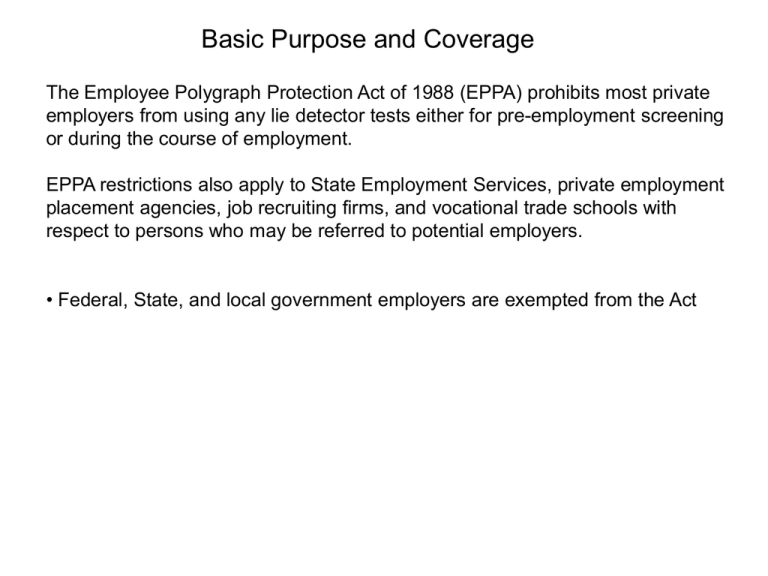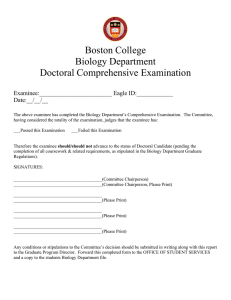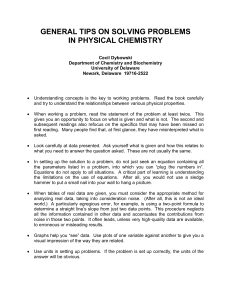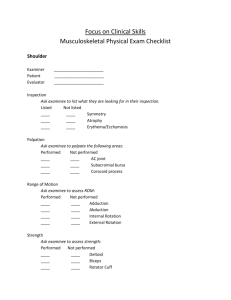Basic Purpose and Coverage
advertisement

Basic Purpose and Coverage The Employee Polygraph Protection Act of 1988 (EPPA) prohibits most private employers from using any lie detector tests either for pre-employment screening or during the course of employment. EPPA restrictions also apply to State Employment Services, private employment placement agencies, job recruiting firms, and vocational trade schools with respect to persons who may be referred to potential employers. • Federal, State, and local government employers are exempted from the Act Requirements Employers are prohibited from: (1) Requiring, requesting, suggesting or causing, directly or indirectly, any employee or prospective employee to take or submit to a lie detector test; (2) Using, accepting, or inquiring about the results of a lie detector test of any employee or prospective employee; and (3) Discharging, disciplining, discriminating against, denying employment or promotion, or threatening any employee or prospective employee to take such action for refusal or failure to take or submit to such test, on the basis of the results of a test, for filing a complaint, for testifying in any proceeding, or for exercising any rights afforded by the Act. An employer who reports a theft or other incident involving economic loss to police or other law enforcement authorities is not engaged in conduct restricted by the Act if, during the normal course of a subsequent investigation, such authorities deem it necessary to administer a polygraph test to an employee(s) suspected of involvement in the reported incident Exemptions for National Defense and Security [Details] • Tests by the Federal Government, in the performance of any counterintelligence function • Any expert, consultant or employee of any contractor under contract with the Department of Defense; or with the Department of Energy, in connection with the atomic energy defense activities of such Department. • The performance of any intelligence or counterintelligence function of the National Security Agency, the Defense Intelligence Agency, or the Central Intelligence Agency, • The Federal Bureau of Investigation Private Sector Exemptions • Tests that are administered in connection with an ongoing investigation involving economic loss or injury to the employer's business, such as theft, embezzlement, misappropriation or an act of unlawful industrial espionage or sabotage; • The employee had access to the property that is the subject of the investigation; • The employer has a reasonable suspicion that the employee was involved in the incident or activity under investigation; • The employer provides the examinee with a statement, in a language understood by the examinee, prior to the test which fully explains with particularity the specific incident or activity being investigated and the basis for testing particular employees and which contains, at a minimum: •) An identification with particularity of the specific economic loss or injury to the business of the employer; • A description of the employee's access to the property that is the subject of the investigation; • A description in detail of the basis of the employer's reasonable suspicion that the employee was involved in the incident or activity under investigation; and • Signature of a person (other than a polygraph examiner) authorized to legally bind the employer [Details] Exemptions for Controlled Substances Exemption of employers authorized to manufacture, distribute, or dispense controlled substances [Details] • Includes an exemption for testing a prospective employee who would have direct access to the manufacture, storage, distribution, or sale of any such controlled substance; or • A current employee who is part on an ongoing investigation Exemption for employers providing security services (i.e., certain armored car, security alarm, and security guard employers) Provided that the employer's function includes protection of: (1) Facilities, materials, or operations having a significant impact on the health or safety of any State or political subdivision thereof, or the national security of the United States, such as– • Facilities engaged in the production, transmission, or distribution of electric or nuclear power, • Public water supply facilities, • Shipments or storage of radioactive or other toxic waste materials, and • Public transportation; or (2) Currency, negotiable securities, precious commodities or instruments, or proprietary information. Some Examples: [Details] Government office buildings; Prisons and correction facilities; Public schools; Public libraries; Water supply; Military reservations, installations, posts, camps, arsenals, Public or private power plants and utilities; Oil or gas refineries and storage facilities; Strategic petroleum reserves; Major dams, Airports; Train terminals, depots, and switching and control facilities; Major bridges and tunnels; Communications centers, such as receiving and transmission centers, and control centers; Transmission and receiving operations for radio, television, and satellite signals; Network computer systems containing data important to public health and safety or national security; The Federal Reserve System and stock and commodity exchanges; Hospitals and health research facilities; Large public events, such as political conventions and major parades, concerts, and sporting events; Large enclosed shopping centers (malls). Adverse employment action under ongoing investigation exemption Exemptions for an ongoing investigation shall not apply if an employer discharges, disciplines, denies employment or promotion or otherwise discriminates in any manner against a current employee based upon the analysis of a polygraph test chart or the refusal to take a polygraph test, without additional supporting evidence such as: • Evidence indicating that the employee had access to the missing or damaged property that is the subject of an ongoing investigation; • Evidence leading to the employer's reasonable suspicion that the employee was involved in the incident or activity under investigation; or • Admissions or statements made by an employee before, during or following a polygraph examination. General Rights of Examinee • The examinee may terminate the test at any time • The examinee may not be asked any questions in a degrading or unnecessarily intrusive manner • The examinee may not be asked any questions dealing with: (a) Religious beliefs or affiliations; (b) Beliefs or opinions regarding racial matters; (c) Political beliefs or affiliations; (d) Sexual preferences or behavior; or (e) Beliefs, affiliations, opinions, or lawful activities concerning unions or labor organizations • The examinee may not be subjected to a test when there is sufficient written evidence by a physician that the examinee is suffering from any medical or psychological condition or undergoing any treatment that might cause abnormal responses during the actual testing phase. ``Sufficient written evidence'' shall constitute, at a minimum, a statement by a physician specifically describing the examinee's medical or psychological condition or treatment and the basis for the physician's opinion that the condition or treatment might result in such abnormal responses • An employee or prospective employee who exercises the right to terminate the test, or who for medical reasons with sufficient supporting evidence is not administered the test, shall be subject to adverse employment action only on the same basis as one who refuses to take a polygraph test, as described in Secs. 801.20 and 801.21 of this part. Rights of examinee [Pretest phase] Provided with written notice (48 hours in advance excluding weekends), in a language understood by the examinee, as to when and where the examination will take place and that the examinee has the right to consult with counsel or an employee representative before each phase of the test. The written notice or proof of service must set forth the time and date of receipt by the employee or prospective employee and be verified by his or her signature. Provision shall also be made for a convenient place on the premises where the examination will take place at which the examinee may consult privately with an attorney or an employee representative before each phase of the test. The attorney or representative may be excluded from the room where the examination is administered during the actual testing phase. Rights of examinee [Pretest phase, cont.] • Informed orally and in writing of the nature and characteristics of the polygraph instrument and examination, including an explanation of the physical operation of the polygraph instrument and the procedure used during the examination. • Provided with a written notice prior to the testing phase, in a language understood by the examinee, which shall be read to and signed by the examinee. • Whether or not the polygraph examination area contains a two-way mirror, a camera, or other device through which the examinee may be observed; • Whether or not any other device, such as those used in conversation or recording will be used during the examination; • That they and the employer have the right, with the other's knowledge, to record the examination; • That they have the right to terminate the test at any time; • That they have the right to review all questions to be asked during the test; • That they may not be asked questions in a manner which degrades, or needlessly intrudes; • That they may not be asked any questions concerning religious beliefs or opinions; beliefs regarding racial matters; political beliefs or affiliations; matters relating to sexual behavior; beliefs, affiliations, opinions, or lawful activities regarding unions or labor organizations; Rights of examinee [Pretest phase, cont.] • That the test may not be conducted if there is sufficient written evidence by a physician that the examinee is suffering from a medical or psychological condition or undergoing treatment that might cause abnormal responses during the examination; • That the test is not and cannot be required as a condition of employment; • That the employer may not discharge, dismiss, discipline, deny employment or promotion, or otherwise discriminate against the examinee based on the analysis of a polygraph test, or based on the examinee's refusal to take such a test, without additional evidence supporting such action; • In connection with an ongoing investigation, that the additional evidence required for the employer to take adverse action against the examinee, including termination, may be evidence that the examinee had access to the property that is the subject of the investigation, together with evidence supporting the employer's reasonable suspicion that the examinee was involved in the incident or activity under investigation • That any statement made by them before or during the test may serve as additional supporting evidence for an adverse employment action, and that any admission of criminal conduct by the examinee may be transmitted to an appropriate government law enforcement agency; Rights of examinee [Pretest phase, cont.] • That information acquired from a polygraph test may be disclosed by the examiner or by the employer only: (A) To the examinee or any other person specifically designated in writing by the examinee to receive such information; (B) To the employer that requested the test; (C) To a court, governmental agency, arbitrator, or mediator pursuant to a court order; (D) To a U.S. Department of Labor official when specifically designated in writing by the examinee to receive such information; (E) By the employer, to an appropriate governmental agency without a court order where, and only insofar as, the information disclosed is an admission of criminal conduct • That if any of the examinee's rights or protections under the law are violated, the examinee has the right to file a complaint with the Wage and Hour Division of the U.S. Department of Labor, or to take action in court against the employer Rights of examinee [Pretest phase, cont.] • That the examinee has the right to obtain and consult with legal counsel or other representative before each phase of the test, although the legal counsel or representative may be excluded from the room where the test is administered during the actual testing phase. • That the employee's rights under the Act may not be waived, either voluntarily or involuntarily, by contract or otherwise, except as part of a written settlement to a pending action or complaint under the Act, agreed to and signed by the parties. • During the initial or any subsequent pretest phases, the examinee must be given the opportunity, prior to the actual testing phase, to review all questions in writing that the examiner will ask during each testing phase. Such questions may be presented at any point in time prior to the testing phase. Rights of examinee [Testing phase] • The examiner shall not ask any question that was not presented in writing for review prior to the testing phase. An examiner may, however, recess the testing phase and return to the pre-test phase to review additional relevant questions with the examinee • No testing period subject to the provisions of the Act shall be less than ninety minutes in length (The ninety-minute minimum duration shall not apply if the examinee voluntarily acts to terminate the test before the completion thereof, in which event the examiner may not render an opinion regarding the employee's truthfulness) Rights of examinee [Post-test phase] Before any adverse employment action, the employer must: • Further interview the examinee on the basis of the test results • Give to the examinee a written copy of any opinions or conclusions rendered in response to the test, as well as the questions asked during the test, with the corresponding charted responses. (The term ``corresponding charted responses'' refers to copies of the entire examination charts recording the employee's physiological responses, and not just the examiner's written report which describes the examinee's responses to the questions as ``charted'' by the instrument.) Qualifications of and requirements for examiners • Have a valid current license, if required by the State in which the test is to be conducted; • Carry a minimum bond of $50,000 provided by a surety incorporated under the laws of the United States or of any State, which may under those laws guarantee the fidelity of persons holding positions of trust, or carry an equivalent amount of professional liability coverage. • Observe all rights of examinees • Administer no more than five polygraph examinations in any one calendar day on which a test or tests subject to the provisions of EPPA are administered, not counting those instances where an examinee voluntarily terminates an examination prior to the actual testing phase; • Administer no polygraph examination subject to the provisions of the Act which is less than ninety minutes in duration, • Render any opinion or conclusion regarding truthfulness or deception in writing. Such opinion or conclusion must be based solely on the polygraph test results. The written report shall not contain any information other than admissions, information, case facts, and interpretation of the charts relevant to the stated purpose of the polygraph test and shall not include any recommendation concerning the employment of the examinee; • Maintain all opinions, reports, charts, written questions, lists, and other records relating to the test for at least three years from the date of the administration of the test.



